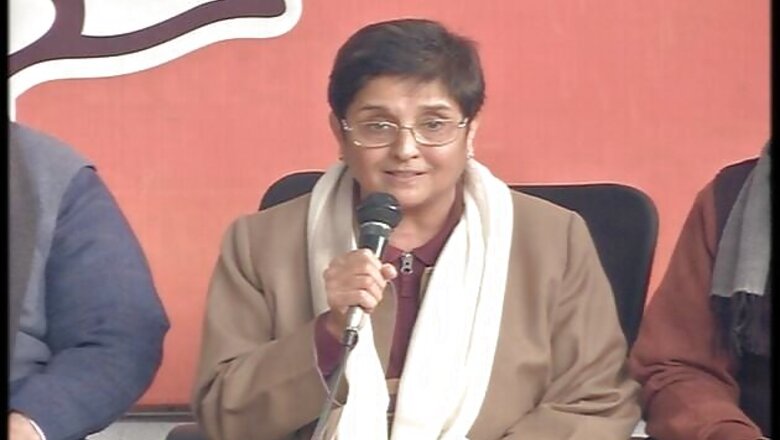
views
Bengaluru: The decision of BJP to nominate Kiran Bedi as its Chief Ministerial candidate for the Delhi polls is an eye catching departure from a trend that was seen with the BJP in the last eight months. It also categorically symbolizes the acceptance of the keen contest likely to witness between BJP and the AAP in the Delhi polls.
In all state assembly elections that have been held since the BJP came to power at the Centre, the party took a conscious decision not to project a leader as its prospective Chief Minister and preferred to project the leadership of its Prime Minister on the one hand and sustain the momentum built up by the Lok sabha victory.
It is important to record that in Maharashtra, Haryana, Jharkhand and Jammu and Kashmir the elections saw a massive sentiment against the incumbent government which the BJP strongly capitalized upon. It was possible for the BJP to launch an aggressive campaign against the incumbent state government and also bask in the goodwill enjoyed by the Central Government as the honeymoon period was still on.
Delhi represents in many significant ways a distinctly different political and electoral ball game. In the first place, there is no visible incumbent to attack. While the AAP is being criticized for having abandoned its government within 49 days of coming to power, they are attempting to turn the tables by admitting their mistake, pointing out to their dependence on the Congress to remain in power and are now pleading for a clear mandate.
The BJP did emerge as the single largest party but chose not to attempt to form the government. Both the Congress and the BJP have to face the criticism of trying to remote control Delhi during the period of Central rule. As a result there is no clear incumbent at whose door the sins of omission and commission can be laid. In that sense, it is a 'free for all' blame game.
Secondly, for the first time after the Lok Sabha polls, the BJP faces a state election where its key opponent has a clear leadership which has the potential for mass appeal. There was no 'Arvind Kejriwal' like Chief Ministerial candidate in either Maharashtra, Haryana, J&K or Jharkhand among the parties ranged against the BJP. This worked to the BJP's advantage as it allowed them to take advantage of projecting its new central leadership. Delhi has altered the whole political equation. An AAP led by a visible and vocal Kejriwal required the BJP to pull out all stops and launch an aggressive campaign.
The Ramlila ground speech of the Prime Minister attacking the AAP, especially its leadership assumes relevance in this context. The open arms welcome to a range of leaders- several from AAP, some new entrants (including Ms Bedi) and even leaders from the Congress who were routed in the Lok Sabha Polls (Ms Krishna Tirath is a case in point), is part of the strategy to strengthen your capacities to deal with AAP. The latest move is to declare a Chief Ministerial candidate. It now makes it possible for the BJP to project it as a Bedi vs Kejriwal fight.
In many significant ways, Ms Bedi represents what Mr Kejriwal has stood for. She represents a 'new' face in politics, she is not your typical politician, she was part of the Anna movement, a crusader against corruption and an 'icon' in her own right. It is of course a huge gamble for the BJP.
Projecting a new comer as its Chief Ministerial candidate, by sidestepping veterans has created some simmering discontent. However, given the way the party functions, the central leadership hopes to quell any possible discord and back the Chief Ministerial candidate to the hilt.
The BJP's decision, which significantly alter the nature and structure of the Delhi contest. There is now no shadow of doubt that this election will be a straight BJP-AAP fight. For the BJP, doing well in Delhi is critical on two counts. First, a defeat in Delhi, would be a huge boost for the AAP and make it the focus of anti-BJP politics in the future.
Secondly, a poor performance in Delhi, would make the fight in Bihar later this year much tougher. It would also dissipate some of the momentum the party has built up in the eight months in power. Winning Delhi is important to continue the victory march and prepare for the big mid-year election. The coming days will see a range of strategies and counter strategies being unleashed by both the BJP and AAP.
(Dr. Sandeep Shastri is a political analyst who is the Pro Vice Chancellor of Jain University)




















Comments
0 comment